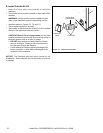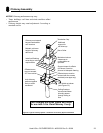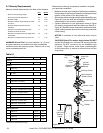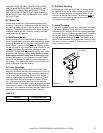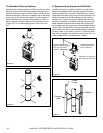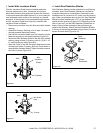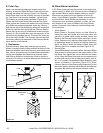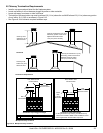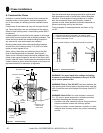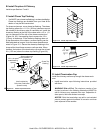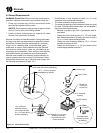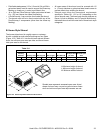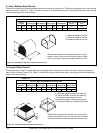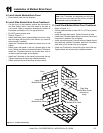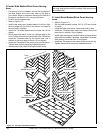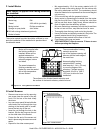
30
9
9
Chase Installations
Ceiling
Firestop
Chase Top Flashing
Termination Cap
False Ceiling
Insulation in the
outside walls
of the chase
Attic
Insulation
Shield
Chimney
Ceiling
Firestop
Tabs
False Ceiling
False Ceiling
Insulation
Insulation
Figure 9.1 Chase Assembly
1 2 3
1. Fireplace and chimney enclosed in an exterior chase.
2. Chimney offset through exterior wall and enclosed in chase.
3. Chase constructed on roof.
Note: In cooler climates, all chase walls should be insulated.
Figure 9.2 Chase Constructions
WARNING! You must install false ceilings and ceiling
fi restops at each fl oor of the chase or every 10 ft (3.05
m) to control spread of fi re.
WARNING! Risk of Fire! You must maintain a minimum
2 in. (51 mm) air space clearance to insulation and other
materials surrounding the chimney system.
• Insulation and other materials must be fi rmly secured to
prevent accidental contact with chimney system.
• Failure to prevent contact between insulation or other
materials and chimney system may cause overheating
and fi re.
WARNING! Risk of Fire! DO NOT seal area between fi re
stop opening and chimney pipe except where they enter the
attic or leave the warm air envelope of the home (use 600° F
sealant).
A. Construct the Chase
A chase is a vertical boxlike structure built to enclose the
fi replace and/or its vent system. Vertical chimneys that
run on the outside of a building must be installed inside a
chase.
Construction of the chase may vary with the type of build-
ing. These instructions are not substitutes for the require-
ments of local building codes. Local building codes MUST
be checked.
A chase should be constructed in the manner of all outside
walls of the home to prevent cold air drafting problems. The
chase should not break the outside building envelope in
any manner. All outer walls need to be insulated.
Building codes require false ceiling and ceiling fi restops
at each fl oor of the chase or every 10 ft (3.05 m) of clear
space to control spread of fi re.
Walls, ceiling, base plate and cantilever fl oor at the fi rst
level of the chase should be insulated. See Figure 9.1.
Vapor and air infi ltration barriers should be installed in the
chase as per regional codes for the rest of the home. Addi-
tionally, Hearth & Home Technologies recommends that the
inside surfaces be sheet rocked and taped (or the use of an
equivalent method) for maximum air tightness.
Gas line holes and other openings should be caulked with
high temperature caulk or stuffed with unfaced fi berglass
insulation. If the fi replace is being installed on a cement
slab, we recommend that in cold climates, a sheet of
plywood or other raised platform be placed underneath to
prevent conducting cold up into the room.
Three examples of chase applications are shown in Fig-
ure 9.2.
Heat & Glo • RUTHERFORD-50 • 4059-333 Rev C • 06/08



